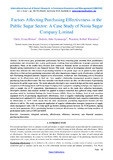Factors Affecting Purchasing Effectiveness in the Public Sugar Sector: A Case Study of Nzoia Sugar Company Limited

View/
Date
2014-06Author
Oteki, Evans B.
Ondieki, J. N.
Wamalwa, R. W.
Metadata
Show full item recordAbstract
In the recent past, procurement performance has been attracting great attention from practitioners, academicians and researchers due to poor performance resulting from non adherence to proper processes and procedures. Many of the studies have devoted their content to financial factors as measures of effectiveness dismally giving consideration to non financial factors. This study aimed at investigating selected non financial factors that influence the effectiveness of purchasing function in the public sugar sector guided by four specific objectives; to find out how purchasing interaction with other departments impacts on its effectiveness, to find out how Purchasing delegated authority impacts on its effectiveness, to find out how Purchasing activity Execution impacts on its effectiveness and to find out how supplier relationship management practices impacts on purchasing function effectiveness. The four variables were found to have an effect on effectiveness of purchasing function in the public sugar sector. The study adopted a descriptive case research design and the study population comprised of 118 management staff Nzoia Sugar Company Ltd. A purposive sampling technique was employed to select a sample size of 57 respondents. Questionnaires were used as the main data collection instruments. Descriptive statistics data analysis method was applied to analyze numerical data gathered using closed ended questions aided by Statistical Package for Social Sciences (SPSS). From the findings, level of task execution explained 43.1% of purchasing department’s effectiveness, level of supplier relationship explained 20.9% and interaction level explained 2.2% while the level of purchasing delegated authority had a negative relationship with its effectiveness at -4.1% which means that the more autonomous purchasing department becomes the less effective it will be. The study recommends application of supplier collaboration strategies, integration of supply chain management tasks with IT to help speed up decision making process between the SCM partners, signing service level agreements (SLA), purchasing function to increase effectiveness by training and being members of professional bodies such as CIPS and KISM.
Collections
- Journal Articles (BE) [333]
